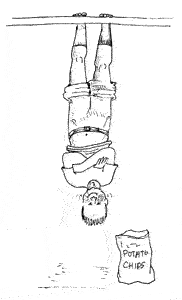STRANGE BUT TRUE- Swallowed up: Hanging around for lunch

Q. Can't say why anybody'd want to, but could you eat while hanging upside down? –D. Fledermaus
A. Swallowed food is grabbed by the smooth muscle of the esophagus, which contracts in front of the bolus and relaxes behind it, thus moving it along toward the stomach, says J.B.S. Haldane in Animal Biology. Owing to this involuntary action, one could as well ingest a meal while heels over head. But don't try this!
Q. The game sure would be different if played with a plain old spheroid instead of a "prolate spheroid." How so? And where does "specular reflection" fit into it? –J. Unitis
A. That's the shape of a football, and as you fans well know, its pointy elongatedness renders it easier to throw than if it were a simple sphere, says Timothy Gay in Football Physics: The Science of the Game. (A true prolate spheroid has more rounded ends, but a football is close.) Because of its shape, the ball is easier to carry, tucked between arm and rib cage to make fumbling less likely. "Finally, the football's unique shape gives it an exceptionally erratic bounce that has unpredictable consequences over the course of the game," Gay says.
Specular reflection is what a laser beam does when it bounces off a mirror–its angle coming in equals its angle going out, close to the way a soccer ball bounces. However, a football will have none of this sort of predictability. For punt and kickoff returners, this means the ball may land at their feet and proceed to bounce out of their grasp. Some fumble-it is victims are even asked by coaches to carry the football with them all week, but a better bet, says Gay, is to keep a low center of body mass and hold the ball four- point style: Vectors, torques and techniques triumphing amid all the black-and-blue.
Q. Time to pop the really big question: Where is human love taking our species? –Casanova
A. As recently as a few generations ago, first- and second-cousin marriages were common– inbreeding– but today's spouses more likely hail from different cities, states, even nations, says Steve Jones in The Language of Genes. And the boon in this is a genetically healthier species because recessive genes threatening disease or malady are typically partnered with a normal copy, masking their effects.
As the world's populations mix, damaged-gene diseases such as cystic fibrosis and sickle-cell anemia, striking Whites and Blacks respectively, will abate. "Only if a child inherits two copies of either of these will it suffer from an inborn disease. Because cystic fibrosis is unknown in Africans and sickle cell in Whites, the child of a Black- White mating is safe from both illnesses."
In time many recessive genes hidden in the descendants of mixed marriages will reappear, but this could take thousands of years. Meanwhile, ever more open-minded Cupid just may be improving the human lot.
Q. Can a 70-year-old woman have a baby? May be coming someday to a fertility clinic near you. –E. Sanger
A. In 2005, a healthy baby girl was born in a New York hospital, conceived with an egg that had been frozen and thawed, only 1 of about 125 children in the world born from frozen eggs, says Judith Newman in Discover magazine. Until recently, it was difficult to thaw unfertilized frozen eggs without destroying them. But New York University reproductive endocrinologist Jamie Grifo and his associate have now frozen and unfrozen the eggs of several women, with positive pregnancy test results comparable to what is seen with in-vitro fertilization.
Now a woman can theoretically freeze her eggs when young, then have her own genetic offspring when she is... 50, 60, or even older, says Newman. There are, of course, ethical quandaries, such as a 60-year-old having a newborn who could easily be motherless by age 15. But the technology could prove a godsend for cancer survivors, who can freeze their eggs before treatment damages their ovaries. By one method, eggs are plunged into liquid nitrogen and cooled at a rate of 36,000 degrees F per minute to 385 degrees F below zero. The thawed eggs have a survival rate of about 90 percent.
"It's too soon to tell if lots of women will actually end up using egg-freezing to delay having families," says Dr. Grifo, "but at least it gives them the possibility."
Send Strange questions to brothers Bill and Rich at , coauthors of "Can a Guy Get Pregnant? Scientific Answers to Everyday (and Not-So- Everyday) Questions," from Pi Press.
#